英译汉翻译的技巧例句
- 格式:ppt
- 大小:111.50 KB
- 文档页数:30
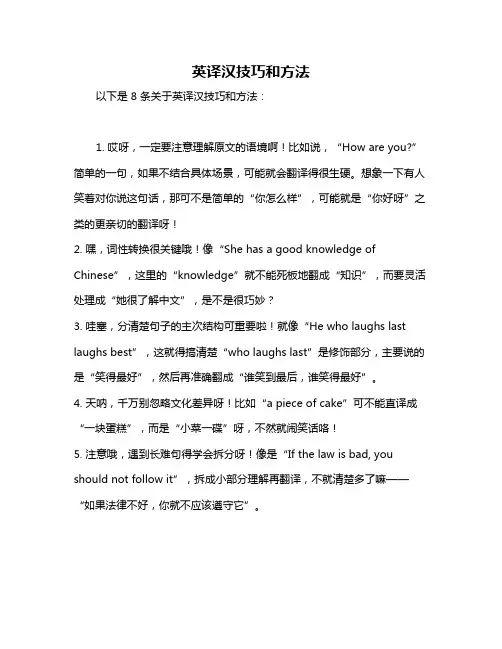
英译汉技巧和方法以下是 8 条关于英译汉技巧和方法:1. 哎呀,一定要注意理解原文的语境啊!比如说,“How are you?” 简单的一句,如果不结合具体场景,可能就会翻译得很生硬。
想象一下有人笑着对你说这句话,那可不是简单的“你怎么样”,可能就是“你好呀”之类的更亲切的翻译呀!2. 嘿,词性转换很关键哦!像“She has a good knowledge of Chinese”,这里的“knowledge”就不能死板地翻成“知识”,而要灵活处理成“她很了解中文”,是不是很巧妙?3. 哇塞,分清楚句子的主次结构可重要啦!就像“He who laughs last laughs best”,这就得搞清楚“who laughs last”是修饰部分,主要说的是“笑得最好”,然后再准确翻成“谁笑到最后,谁笑得最好”。
4. 天呐,千万别忽略文化差异呀!比如“a piece of cake”可不能直译成“一块蛋糕”,而是“小菜一碟”呀,不然就闹笑话咯!5. 注意哦,遇到长难句得学会拆分呀!像是“If the law is bad, you should not follow it”,拆成小部分理解再翻译,不就清楚多了嘛——“如果法律不好,你就不应该遵守它”。
6. 哎呀呀,适当增减词会让翻译更通顺呢!比如“He gave me a book”翻成“他给了我一本书”,要是原文强调只给了一本,那就可以加上“仅仅”之类的词更准确。
7. 哈哈,反复琢磨很有必要呀!像“Love me, love my dog”要是不仔细想,可能就翻译成“爱我,爱我的狗”,这就不对啦,应该是“爱屋及乌”呀!8. 记住哟,选取合适的汉语词汇来对应英语很有讲究哒!比如说“black tea”总不能翻成“黑茶”,而是“红茶”呀!总之,英译汉靠的就是这些小技巧和方法,多练多总结准没错!。
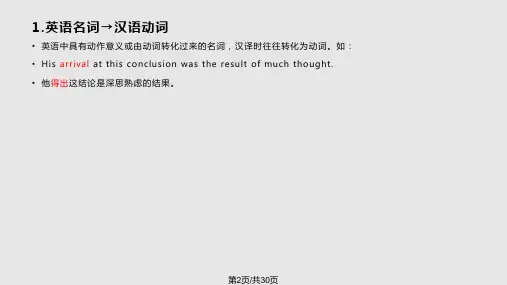
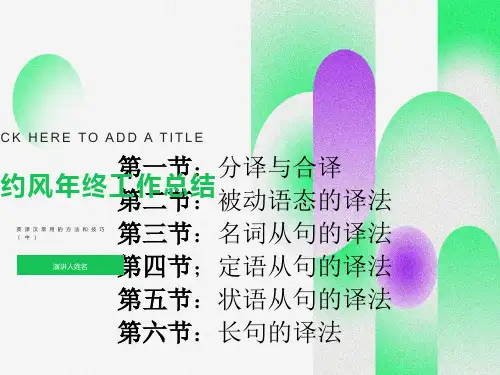
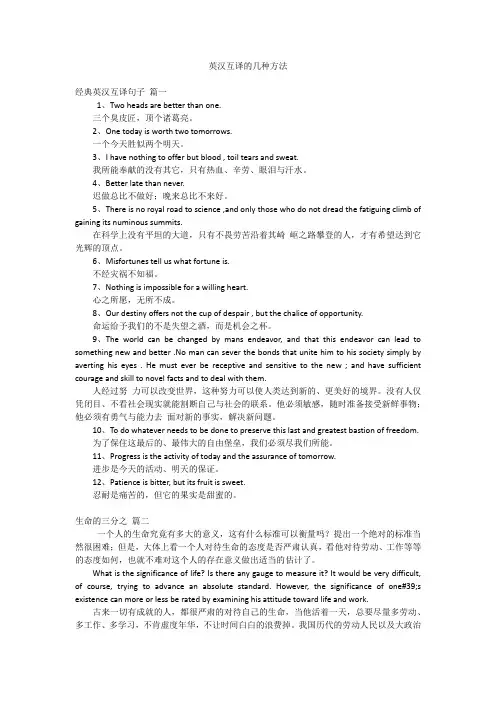
英汉互译的几种方法经典英汉互译句子篇一1、Two heads are better than one.三个臭皮匠,顶个诸葛亮。
2、One today is worth two tomorrows.一个今天胜似两个明天。
3、I have nothing to offer but blood , toil tears and sweat.我所能奉献的没有其它,只有热血、辛劳、眼泪与汗水。
4、Better late than never.迟做总比不做好;晚来总比不来好。
5、There is no royal road to science ,and only those who do not dread the fatiguing climb of gaining its numinous summits.在科学上没有平坦的大道,只有不畏劳苦沿着其崎岖之路攀登的人,才有希望达到它光辉的顶点。
6、Misfortunes tell us what fortune is.不经灾祸不知福。
7、Nothing is impossible for a willing heart.心之所愿,无所不成。
8、Our destiny offers not the cup of despair , but the chalice of opportunity.命运给予我们的不是失望之酒,而是机会之杯。
9、The world can be changed by mans endeavor, and that this endeavor can lead to something new and better .No man can sever the bonds that unite him to his society simply by averting his eyes . He must ever be receptive and sensitive to the new ; and have sufficient courage and skill to novel facts and to deal with them.人经过努力可以改变世界,这种努力可以使人类达到新的、更美好的境界。

英译汉翻译技巧最新_例句1. The book provides a step-by-step guide on how to improve your translation skills.这本书提供了一份逐步指导,告诉你如何提高翻译技巧。
2. One of the key translation techniques is to understand the cultural context of the source language.了解源语言的文化背景是翻译的关键技巧之一3. It is important to maintain the tone and style of the original text when translating literary works.翻译文学作品时,保持原文的语气和风格非常重要。
4. Translating idioms and expressions can be challenging, as they often have different equivalents in different languages.翻译习语和表达往往具有挑战性,因为它们在不同语言中的等效词通常不同。
5. Using parallel structures in translations can help createa more natural and fluent target text.在翻译中使用并列结构可以帮助创造出更自然流畅的目标文。
6. A good translator should always strive for accuracy and attention to detail.一个优秀的翻译者应该始终追求准确性和对细节的关注。
7. Translating technical documents requires a strong understanding of specialized terminology.翻译技术文档需要对专业术语有深入的了解。
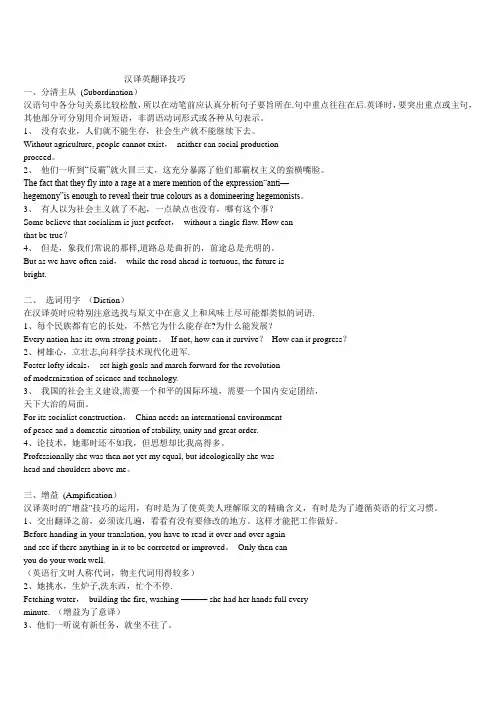
汉译英翻译技巧一、分清主从(Subordination)汉语句中各分句关系比较松散,所以在动笔前应认真分析句子要旨所在.句中重点往往在后.英译时,要突出重点或主句,其他部分可分别用介词短语,非谓语动词形式或各种从句表示。
1、没有农业,人们就不能生存,社会生产就不能继续下去。
Without agriculture, people cannot exist,neither can social productionproceed。
2、他们一听到“反霸”就火冒三丈,这充分暴露了他们那霸权主义的蛮横嘴脸。
The fact that they fly into a rage at a mere mention of the expression“anti—hegemony”is enough to reveal their true colours as a domineering hegemonists。
3、有人以为社会主义就了不起,一点缺点也没有,哪有这个事?Some believe that socialism is just perfect,without a single flaw. How canthat be true?4、但是,象我们常说的那样,道路总是曲折的,前途总是光明的。
But as we have often said,while the road ahead is tortuous, the future isbright.二、选词用字(Diction)在汉译英时应特别注意选找与原文中在意义上和风味上尽可能都类似的词语.1、每个民族都有它的长处,不然它为什么能存在?为什么能发展?Every nation has its own strong points。
If not, how can it survive?How can it progress?2、树雄心,立壮志,向科学技术现代化进军.Foster lofty ideals,set high goals and march forward for the revolutionof modernization of science and technology.3、我国的社会主义建设,需要一个和平的国际环境,需要一个国内安定团结,天下大治的局面。
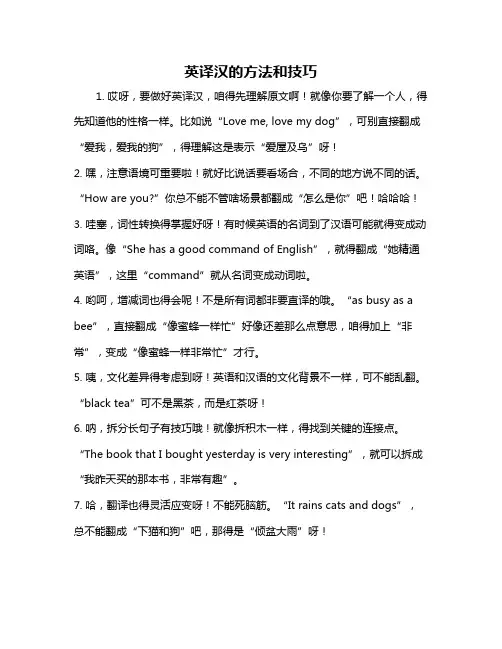
英译汉的方法和技巧
1. 哎呀,要做好英译汉,咱得先理解原文啊!就像你要了解一个人,得先知道他的性格一样。
比如说“Love me, love my dog”,可别直接翻成“爱我,爱我的狗”,得理解这是表示“爱屋及乌”呀!
2. 嘿,注意语境可重要啦!就好比说话要看场合,不同的地方说不同的话。
“How are you?”你总不能不管啥场景都翻成“怎么是你”吧!哈哈哈!
3. 哇塞,词性转换得掌握好呀!有时候英语的名词到了汉语可能就得变成动词咯。
像“She has a good command of English”,就得翻成“她精通英语”,这里“command”就从名词变成动词啦。
4. 哟呵,增减词也得会呢!不是所有词都非要直译的哦。
“as busy as a bee”,直接翻成“像蜜蜂一样忙”好像还差那么点意思,咱得加上“非常”,变成“像蜜蜂一样非常忙”才行。
5. 咦,文化差异得考虑到呀!英语和汉语的文化背景不一样,可不能乱翻。
“black tea”可不是黑茶,而是红茶呀!
6. 呐,拆分长句子有技巧哦!就像拆积木一样,得找到关键的连接点。
“The book that I bought yesterday is very interesting”,就可以拆成“我昨天买的那本书,非常有趣”。
7. 哈,翻译也得灵活应变呀!不能死脑筋。
“It rains cats and dogs”,总不能翻成“下猫和狗”吧,那得是“倾盆大雨”呀!
8. 嘿,多积累多练习可不能忘呀!只有这样才能越来越厉害。
就像学骑自行车,多骑骑就会啦!
我觉得呀,英译汉的方法和技巧都掌握了,那翻译起来就能又快又好啦!。
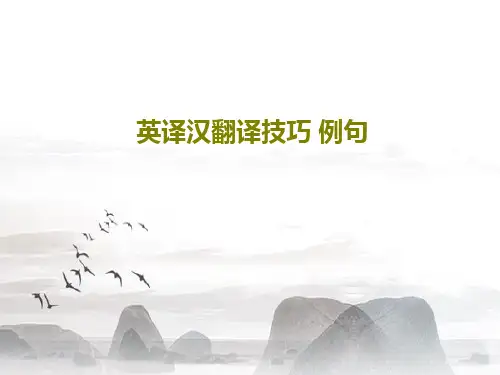
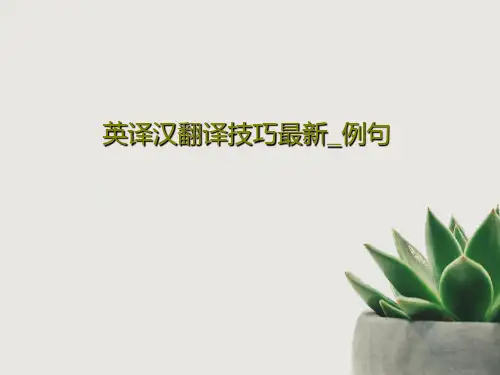


英汉互译技巧及实例
英汉互译技巧及实例:
一、词汇选择
在翻译过程中,选择适当的词汇非常重要。
有时候,英文中一个简单的词汇,在中文中可能有多种解释,因此需要根据上下文进行选择。
例如,“bank”可以翻译为“银行”或“河岸”,具体翻译需要根据上下文进行判断。
二、句子结构调整
由于英汉两种语言的语法结构不同,因此在翻译过程中需要对句子结构进行调整。
例如,“I like the book because it is interesting.”可以翻译为“我喜欢这本书,因为它很有趣。
”这种调整使得译文更加符合中文的表达习惯。
三、文化背景考虑
在翻译过程中,需要考虑文化背景。
有些词汇在特定的文化背景下有特殊的含义,因此在翻译时需要注意。
例如,“white elephant”在英文中表示“无用而累赘的东西”,而在中文中则没有这个含义。
四、实例
原文:The company has a strong commitment to quality.
译文:公司对质量有着坚定的承诺。
分析:在这个例子中,“stron g commitment”被翻译为“坚定的承诺”,这种表达更加符合中文的表达习惯。
如果直接翻译为“强有力的承诺”,则可能会让读者感到有些生硬。
英文七式翻译绝招一、同义反译法例子:1.Only three customers remained in the bar.酒吧间只有三个顾客还没有走。
(不译:还留着或还呆在那里)2. I'll be here for good this time.这一次我再也不走了。
(不译:永远在此呆下去)3. Please keep the fire burning when I'm out.我不在家的时候,请别让炉子灭了。
(不译:我外出时,请让炉子继续烧着)4. "Wait, he is serious.""等等,他不是说着玩儿的。
"(不译:等等,他是认真的。
)二、删减解释词例子:The traveller in the south must often have remarked that peculiar air of refinement, that softness of voice and manner, which seems in many cases to be a particular gift to the quotation and mulatto women.到南方去的人看见那些黑白混血的女郎,准定会注意到她们十之八九都赋有那种独特的优雅风度、那种柔和的声调和文静的举止。
三、短句拆译例子:" ...on one sunshiny morning in June , ..."在六月里的一天早上,天气晴朗,......四、译词推陈出新例子:When he might well have acted with boldness, he found himself filled with doubts, scruples and equivocations, in addition to the ordinary fears of a lower.原译:当他可以大胆行动的时候,他发现自己除了一个情人所具有的那种普通的害怕之外,心里还充满怀疑、顾虑和踌躇。
中译英延伸法的例子
1. “哎呀,你看中文里说‘我很开心’,那翻译到英文不就是‘I am very happy’嘛,这多直接呀!”
2. “嘿,‘我爱你’,这简单的中文,延伸到英文就是‘ I love you’,多好记呀!”
3. “哇塞,‘今天天气真好’,可不就变成‘Today's weather is really good’了嘛,是不是挺有意思?”
4. “想想看,‘我要吃饭’,那英语就是‘I want to eat’,贼简单呢!”
5. “你说说,‘他跑步很快’,这不就是‘He runs very fast’嘛,简单易懂!”
6. “哎呀呀,‘她很漂亮’,英文就是‘She is very beautiful’呀,很直观吧!”
7. “瞧瞧,‘我们一起玩’,不就是‘We play together’嘛,多明显呀!”
8. “哈哈,‘这只猫很可爱’,翻译过去‘This cat is very cute’,很形象吧!”
9. “咋样,‘我喜欢看书’,对应‘I like reading books’,就是这么自然而然呀!”
结论:中译英延伸法其实很有趣也很实用呀,可以让我们更好地理解和掌握两种语言呢!。
十大翻译技巧1、增译法:指根据英汉两种语言不同的思维方式、语言习惯和表达方式,在翻译时增添一些词、短句或句子,以便更准确地表达出原文所包含的意义。
如:(1)What about calling him right away?马上给他打个电话,你觉得如何?(增译主语和谓语)(2)If only I could see the realization of the four modernizations.要是我能看到四个现代化实现该有多好啊!(增译主句)(3) Indeed, the reverse is true实际情况恰好相反。
(增译名词)2、省译法:这是与增译法相对应的一种翻译方法,即删去不符合目标语思维习惯、语言习惯和表达方式的词,以避免译文累赘。
增译法的例句反之即可。
又如:(1)You will be staying in this hotel during your visit in Beijing.你在北京访问期间就住在这家饭店里。
(省译物主代词)(2)I hope you will enjoy your stay here.希望您在这儿过得愉快。
(省译物主代词)(3)中国政府历来重视环境保护工作。
The Chinese government has always attached great importance to environmental protection. (省译名词)3、转换法:指翻译过程中为了使译文符合目标语的表述方式、方法和习惯而对原句中的词类、句型和语态等进行转换。
具体的说,就是在词性方面,把名词转换为代词、形容词、动词;把动词转换成名词、形容词、副词、介词;把形容词转换成副词和短语。
在句子成分方面,把主语变成状语、定语、宾语、表语;把谓语变成主语、定语、表语;把定语变成状语、主语;把宾语变成主语。
在句型方面,把并列句变成复合句,把复合句变成并列句,把状语从句变成定语从句。
汉译英的技巧
以下是 7 条关于汉译英的技巧:
1. 理解原文意思那可是超级重要的呀!就像“她笑起来像朵花”,你不能直接译成“She smiles like a flower”,得理解这其实是说她笑得很甜美呀,更合适的是“She has a sweet smile like a flower”。
2. 注意词汇选择要多用心呀!比如说“累垮了”,可不是“tired break”,而是“be exhausted”,这差异大吧!
3. 句子结构转换要灵活哟!像“我喜欢唱歌和跳舞”,不能死译成“I like singing and dancing”,更地道的可以是“I enjoy singing as well as dancing”。
4. 文化差异要考虑到哇!“红茶”不是“red tea”,而是“black tea”,这就是文化不同导致的呀,能不注意吗?
5. 成语和俗语翻译有诀窍哒!比如“画蛇添足”不能真的译成“draw
a snake and add feet”,而是“gild the lily”,是不是很有意思?
6. 注意时态和语态的正确使用呢!“他昨天被雨淋了”,那就是“He was caught in the rain yesterday”呀。
7. 多多参考优秀译文有帮助咧!就像名著的翻译版本,那真的是能学到好多呢,你说是不是呀?
总之,汉译英可没那么简单,得用心、细心加耐心,不断学习和积累才能做好呀!。
英汉翻译常用的方法和技巧练习(一)一,对斜体部分,根据汉语表达习惯作些增添1. unemployement is widespread in some countries有些国家失业现象普遍2 。
the employers there used violence.那里的雇主使用了暴力手段3. mary spoke with restraint in her face.玛丽说话时脸上露出了拘谨的神色4. after aunt lena had heard about the family trouble , she agreed to look for a job. 丽娜阿姨听到了家庭的困难情况后,同意去找工作。
二、对斜体部分,根据汉语表达习惯作些省略1. there is some thruth in what he says .他的话有些道理2. don't let your imagination run away with you 不要乱想3. i can't even remember clearly what he looked like .我连他的模样也记不清楚了4. he also asked what had happened to me since we separated.他还问我别后的情况。
三、对斜体部分,根据汉语表达习惯改变词类1. our hearty desire is the establishment of a lasting peace in the world我们的衷心愿望时建立世界持久和平2.the sentry stood guard with a submachine gun in his hand.哨兵持冲锋枪站岗3. the workers turned hopefully to that organization工人对那个信组织抱着很大希望4. the war was immediately caused by incursions across the borders那次战争的直接原因时侵入国境四、对斜体部分,要求从反面表达,但不改变原义1. he tried to catch one of the rafts with a boat-hook,but missed.他想用一根船钩去钩一个木筏,但没有钩着2. they had better keep their promise because everything hinges on that right now. 他们最好不要失信,因为目前一切都要以此为转移3. these are days when nerves are worn thin.这些日子精神上有些受不了4. all night long the beating and questioning goes on , the search goes on.拷打、审讯彻夜不停,搜捕彻夜不停五、对斜体部分,根据汉语表达习惯改变语态1. i have been sent here by the norwegian shipping company t o talk with you about transportation.我是挪威轮船公司派来和贵方商谈运输问题的2. everything he advertised was guaranteed to last "forever"他保证他广告中所登的东西都能“永久”使用3. my fist thirty years were spent in western america.我的前三十年时在美国西部度过的4. an individual is judged by how he serves the collective, but the collective is expected to cherish the lives and talents of its individuals.判断一个人要看他对集体服务得怎样,但是集体也要忠实个人得生活和才能一、翻译句子,注意right 在句中的词类来确定它的词义1. it is not right for children to sit up late 孩子们睡得晚不好adj2. the plane was right above out heads 飞机正好在我们头上面adv3. in the negative, right and left, and black and white are reversed 照片底片上,左右黑白与正片恰好相反n4. she tried her best to right her husband from the charge of robbery 她尽力为她丈夫被控抢劫伸冤v二、翻译句子,注意根据上下文及搭配关系来确定斜体词的词义account for1. he is ill; that accounts for his absence. 他病了,这就是他缺席的原因2. In this battle he accounted for five of the enemy 他在这场战斗中消灭了五个敌人3. i want you to account for every cent you spent 我要你把花费的每分钱都交代清楚make up1. if the stove isnt't made up, it will go out 如不添煤,炉子就会熄灭2. there isn't any girl called Clementine. he's just made her up 根本没有个叫。